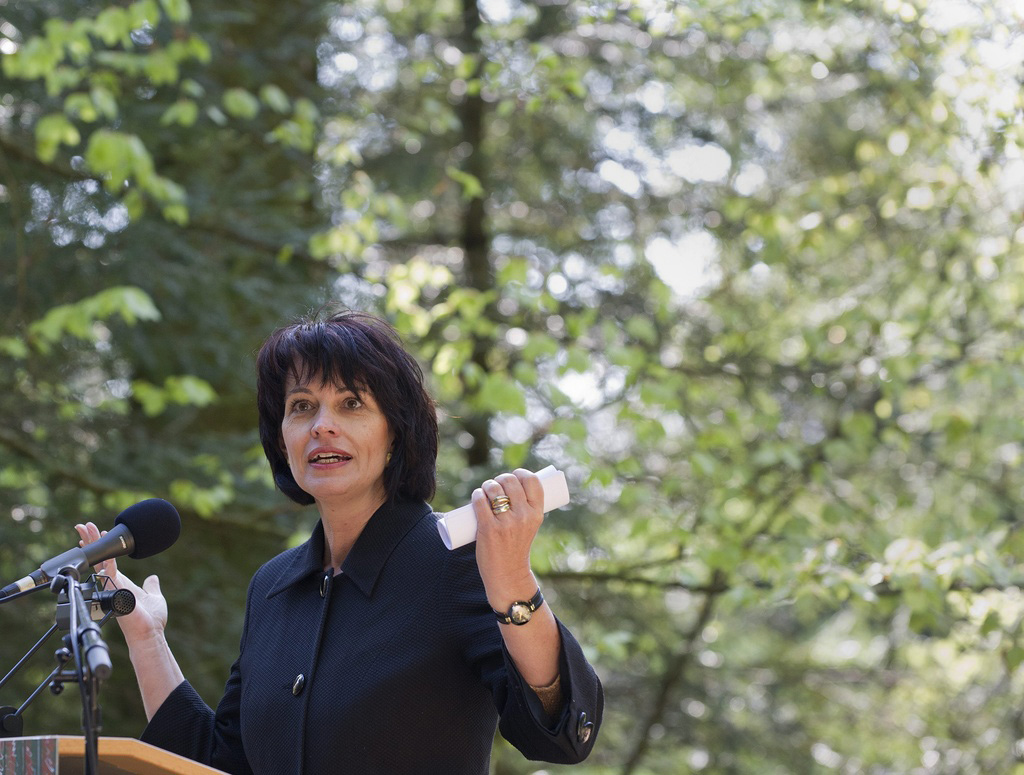Leuthard warns against egoism in green issues

Swiss Environment Minister Doris Leuthard, on a three-day visit to the United States, has said egoism must be put aside in the fight against climate change.
In a speech at the renowned Massachusetts Institute of Technology (MIT), near Boston, the minister also proposed abandoning the principle that climate change accords should be secured by unanimity alone.
The effects of climate change are not restricted to national borders and any delay in acting could be fatal, Leuthard warned on Wednesday at the end of her trip to discuss environmental issues. The climate summit in Cancun, Mexico, at the end of last year, had brought no firm commitments.
“Everyone is trying to protect their own interests, instead of acting in the interests of the world community,” said Leuthard. “It is very difficult to reach unanimity in a world characterised by individualism and egoism.”
The minister said countries should examine whether the principle of unanimity “was the only way to find solutions”.
In the United Nations document that has provided the framework to climate change talks since the beginning of the 1990s, a clause allows governements to formally chose whether they want a majority or full agreement. But this article has never been used and the principle of unanimity has always been used by default.
Idea for reflection
Despite Leuthard’s forthright speech, the environment ministry toned down its possible impact.
“It’s not a definite proposal, but simply an idea for further reflection,” ministry spokeswoman Dominique Bugnon, told swissinfo.ch. “It’s not the first time that Doris Leuthard has raised this issue publicly. She already did so when she was economics minister.”
But Bugnon explained that the idea is grounded in a “general problem linked to the multilateral system”.
“We always come up against the same problem; it’s hard to reach unanimous decisions and so in the end we are left with nothing,” she noted.
According to Greenpeace’s United States’ branch, Switzerland is one of the few countries that has proposed abandoning the unanimity approach to climate change talks.
“To my knowledge, Papua New Guinea is another country calling to scrap the consensus-based requirement,” said Kyle Ash, a lawyer and climate talks negotiator from Greenpeace USA.
“There are benefits and drawbacks to the consensus principle, the voices in the room who are keeping an agreement from happening are coming from the US, in particular, and from some other industrialized countries, but on the other hand, we don’t want to lose the voice of the developing countries in the debate,” he commented.
Dragging their feet
According to Ash, the climate change position of the Obama Administration has weakened over time.
He said the chief US climate negotiator, Todd Stern, who met Leuthard this week in Washington, had first said, “we need an agreement”, then “we need an agreement at some point”, then “we don’t know when we’ll get an agreement” and now “an agreement is not necessary and we can reduce emissions without an agreement“.
“The strategy of the Obama administration is to stall a legal agreement, to even stall the discussions on an agreement until they feel the US is ready for it politically, but that may take quite some time,” warned Ash.
While the governement favours stalling tactics on the international scene, internally it appears to be pursuing an appeasement strategy, or even agreement, with the Republicans, he said.
In a major speech on energy security this spring President Barack Obama called for 80 per cent of the US electricity in 2035 to come from “a wide range of clean energy sources,” in which he included natural gas, nuclear power and clean coal.
“This was a huge disappointment,” said Ash.
Swiss lead the way
In her speech Leuthard pointed to the Swiss opt-out of nuclear energy by 2034 as showing how politics can give impetus to green issues.
Politics must create incentives necessary for technology transfer and for bringing new, environmentally-friendly products to consumers, added the minister.
With the 2012 presidential race underway, Obama and US political leaders appear even less willing than in the past to show leadership over climate change issues, especially in renewable energy and public transport.
In her MIT speech, Leuthard commented on Washington’s sluggishness but urged policymakers not to forget the long term.
“It doesn’t help to think and act in four-year electoral cycles,” said the environment minister. “It’s more likely we will meet our objectives if we think and act in terms of decades, especially regarding environment, energy and transport questions.”
Leuthard was in the United States for three days. In Washington the environment minister met the chief US climate negotiator, Todd Stern, and deputy secretary for energy Arun Majumdar, who is head of the Advanced Research Projects Agency.
At Harvard University she met experts working on environment and energy questions and at the Massachusetts Institute of Technology (MIT) near Boston she gave a speech and participated in a round table event together with Patrick Aebischer, president of Lausanne’s Federal Institute of Technology.
Kyoto, a 178-nation accord, is a 1997 protocol to the 1992 UN climate treaty that requires 37 industrial nations to reduce greenhouse gas emissions by an average of 5% below 1990 levels by 2012.
The Swiss parliament ratified the Kyoto Protocol on climate change in 2003. Switzerland undertook to reduce its CO2 emissions to 10% less than 1990 levels by 2010.
The government foresees raising the target to at least a 20% cut in emissions by 2020, partly through a CO2 tax, an emissions trading system and compensation measures outside Switzerland.
The UN Framework Convention on Climate Change 2011 is being held in Durban, South Africa from November 28-December 9.
After the failure of the Copenhagen talks and compromise in Cancun in 2010, delegates will be trying to resolve the fate of the Kyoto protocol, which expires in 2012.
But the chances of agreeing on a legally binding deal to tackle climate change in South Africa has been dismissed by climate envoys from the European Union and the United States, two of the world’s largest emitters.
(Translated from French by Simon Bradley)

In compliance with the JTI standards
More: SWI swissinfo.ch certified by the Journalism Trust Initiative




You can find an overview of ongoing debates with our journalists here. Please join us!
If you want to start a conversation about a topic raised in this article or want to report factual errors, email us at english@swissinfo.ch.